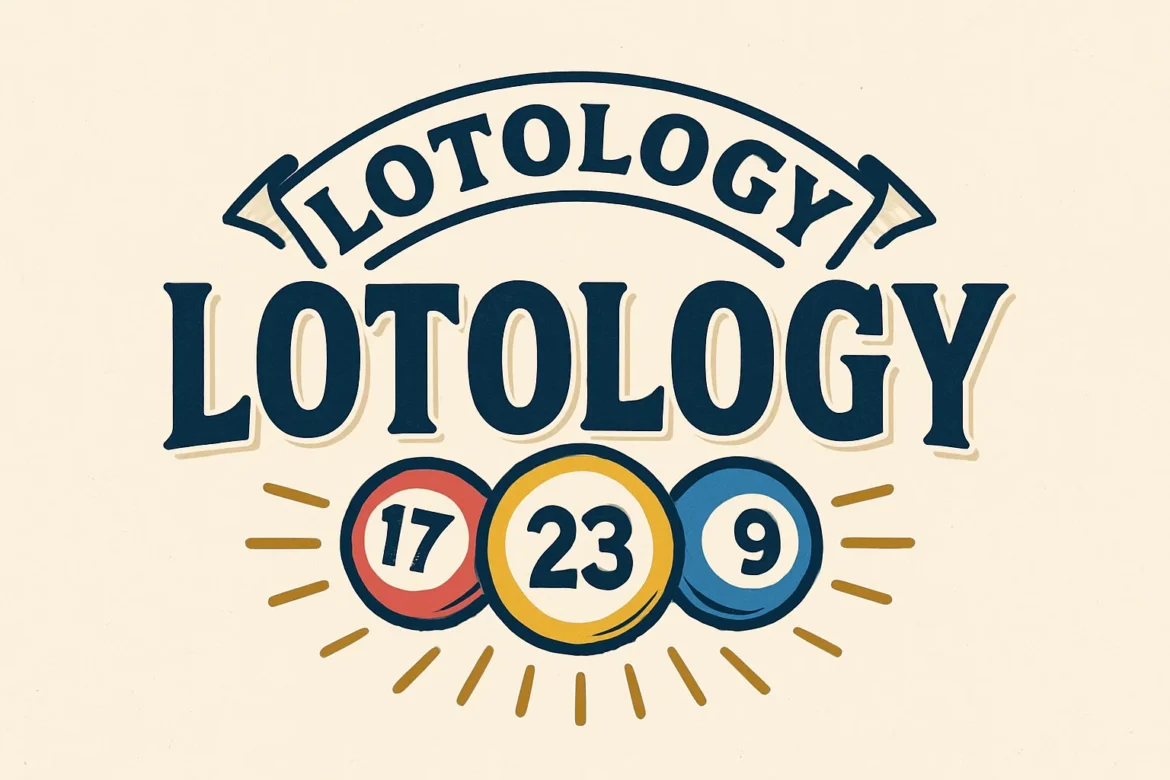
Lotology, an emerging niche field, revolves around the study, analysis, and interpretation of lottery systems. Though not officially recognized as a mainstream academic discipline, it has gained traction among statisticians, mathematicians, data analysts, gamblers, and curious thinkers alike. Lotology seeks to understand the mechanics behind lottery draws, uncover patterns, and evaluate the odds and psychological behavior of lottery players. With lotteries being a billion-dollar industry worldwide, the need to comprehend their deeper aspects has never been more relevant. Lotology merges statistical insight with human behavior, bridging luck and logic in a unique way.
Origins and Etymology of Lotology
The term “lotology” is a blend of “lottery” and the suffix “-logy,” meaning “the study of.” While its roots are informal and relatively modern, the practices it encompasses have existed for centuries. People have tried to “crack the lottery code” since the first public lottery appeared in 15th-century Europe. Lotology, as a term, gained popularity online among forums and communities devoted to lottery discussion and prediction strategies. It was used to describe a more systematized, analytical approach to lottery numbers, moving beyond superstition into the realm of data science and mathematics.
The Psychological Allure of the Lottery
To understand lotology, one must first understand why lotteries captivate millions of people. The psychological allure of the lottery lies in the promise of life-changing wealth from minimal effort or investment. This dream appeals to both the wealthy and the impoverished, but especially to individuals with limited economic mobility. Behavioral economics explains that the perceived value of the lottery far exceeds its actual worth, which fuels participation despite minuscule odds. Lotology often examines this psychological element, exploring how hope, fantasy, and irrational optimism drive lottery behavior and ticket sales.
Statistical Foundation of Lotology
At the heart of lotology lies statistics. Lotologists dive deep into the mathematics behind number combinations, odds, and probability distributions. Most standard lotteries are based on combinations of numbers drawn from a fixed pool — for example, choosing 6 numbers from a pool of 49. The number of possible combinations is calculable, and from that, the odds of winning any particular prize can be derived. Lotologists analyze historical data to look for statistical anomalies, number frequencies, hot and cold numbers, and potential patterns that could suggest more likely combinations. Although lotteries are designed to be random, the human brain is hardwired to seek patterns — and lotology caters to that drive.
The Role of Machine Learning in Modern Lotology
With the advent of artificial intelligence and big data analysis, lotology has begun to incorporate machine learning. Algorithms can analyze millions of past draws to detect minute trends, build predictive models, and simulate outcomes. While true randomness cannot be predicted, lotologists use these tools to determine if certain patterns emerge more often than expected in theoretical randomness. Techniques such as neural networks, regression models, and clustering are employed to “train” programs on historical draws and generate potentially favorable number sets. Though not infallible, this blend of technology and gambling fascination drives a new generation of lotologists.
Lotology vs. Lottery Myths
Lotology stands in stark contrast to common lottery myths and superstitions. While many players believe in lucky numbers, astrological guidance, or avoiding previous winning numbers, lotologists aim to debunk these myths using data. For instance, the belief that “a number is due” is known as the gambler’s fallacy — assuming that past results influence future outcomes in independent events. Lotology encourages players to approach the lottery as a game of chance governed by mathematics, not emotion or myth. By highlighting logical fallacies, lotology provides a more grounded framework for understanding lottery outcomes.
Historical Patterns and Number Frequencies
 A core component of lotology is analyzing number frequency charts. These charts record how often each number appears over time. Lotologists study these patterns to identify “hot” numbers (frequently drawn), “cold” numbers (rarely drawn), and “overdue” numbers (not drawn recently). While randomness implies all numbers are equally likely, statistical clustering does occur in real-life data, sometimes due to imperfections in random number generation or draw machines. Lotologists use frequency analysis not to guarantee wins, but to guide informed number selection strategies. This systematic approach often appeals to those who enjoy structure and analysis.
A core component of lotology is analyzing number frequency charts. These charts record how often each number appears over time. Lotologists study these patterns to identify “hot” numbers (frequently drawn), “cold” numbers (rarely drawn), and “overdue” numbers (not drawn recently). While randomness implies all numbers are equally likely, statistical clustering does occur in real-life data, sometimes due to imperfections in random number generation or draw machines. Lotologists use frequency analysis not to guarantee wins, but to guide informed number selection strategies. This systematic approach often appeals to those who enjoy structure and analysis.
The Ethics of Lotology
An important aspect of lotology is its ethical implications. Since the lottery is often criticized for exploiting vulnerable populations, lotologists walk a fine line between analysis and encouragement of gambling behavior. Many in the field stress responsible participation and transparency in their findings. Ethical lotologists view their work as educational — providing insights into probability and randomness — rather than a get-rich-quick tool. Some even collaborate with researchers and policymakers to better understand gambling behaviors and suggest improvements in regulation and consumer protection.
Famous Lotology Enthusiasts and Influencers
Over the years, several individuals have become synonymous with advanced lottery analysis. Names like Richard Lustig, a seven-time lottery winner who wrote books on strategy, have gained both fame and scrutiny. While not all self-proclaimed experts are embraced by the lotology community (due to lack of scientific rigor), others have made genuine contributions by developing models, writing papers, or building online tools. In forums like Reddit’s r/Lottery or specialized YouTube channels, lotologists share theories, challenge conventional wisdom, and foster a vibrant intellectual community.
Lotology Software and Tools
There is a growing ecosystem of software tools designed to support lotology. These range from simple number generators and frequency analyzers to advanced lottery simulators powered by AI. Many are free or open-source, while others are sold as commercial prediction systems. Lotology tools typically allow users to input past draw data, apply filters, track statistical trends, and simulate combinations. However, users must approach such tools critically, understanding that no software can circumvent the fundamental randomness of the lottery. Lotologists often caution against systems that promise guaranteed wins, as these are usually scams.
Global Lottery Systems and Regional Differences
Lotology is not a one-size-fits-all practice; different countries and regions have varied lottery systems with distinct rules, odds, and drawing mechanisms. For example, the U.S. Powerball and Mega Millions operate differently from the UK National Lottery or EuroMillions. Lotologists must adapt their analytical methods to suit each system. Additionally, cultural attitudes toward gambling vary globally, influencing how lotology is perceived and practiced. In countries where gambling is heavily regulated or stigmatized, lotology remains underground, while in others, it thrives openly as a legitimate analytical pursuit.
Criticisms and Limitations of Lotology
Despite its analytical approach, lotology faces criticism from statisticians and skeptics who argue that studying randomness is inherently futile. The primary critique is that no amount of analysis can change the odds in a truly random system. Critics also warn that lotology may give false hope to individuals who misinterpret statistical suggestions as predictions. Responsible lotologists acknowledge these limitations and stress that their work does not guarantee success but rather offers deeper understanding. Like other probabilistic studies — such as weather forecasting or stock analysis — lotology operates in the gray area of possibility, not certainty.
The Future of Lotology
The future of lotology lies in its integration with data science, psychology, and behavioral economics. As data becomes more accessible and computational power grows, lotologists can conduct deeper, more complex analyses. Some speculate that lotology could evolve into a sub-field of behavioral analytics or even find applications in cryptography and security systems. There’s also growing interest in applying blockchain to lotteries, which could make outcomes more transparent — a development lotologists are keen to explore. As technology advances, lotology is poised to transform from a hobbyist endeavor to a respected data discipline.
Lotology in Popular Culture
Lotology has begun to appear in popular culture, from documentaries to podcasts and even fiction. Stories of individuals who have cracked lottery codes or used statistics to win big attract public fascination. Shows like “Who Wants to Be a Millionaire?” and films like 23 or Pi have elements of lotology embedded in their narratives. While often dramatized, these representations spark interest in the science behind chance. The mystique of the lottery, combined with the allure of intelligence over luck, makes lotology a compelling cultural motif.
Lotology and Financial Literacy
An unexpected benefit of lotology is its contribution to financial literacy. By teaching concepts like probability, expected value, and risk management, lotology helps people make more informed decisions not just about lotteries but about finances in general. Some educators have even used lottery simulations to teach probability in classrooms. By demystifying the mechanisms behind games of chance, lotology fosters critical thinking and encourages skepticism — valuable skills in both gambling and investing contexts. It empowers individuals to view lotteries not just as dreams, but as mathematical constructs.
Building a Career in Lotology
While lotology is not yet a formal profession, there are ways to turn an interest in lottery analysis into a career. Data analysts, statisticians, and behavioral researchers can contribute to the field through publications, consultancy, or software development. Additionally, content creators — such as YouTubers, bloggers, and authors — are carving out niches by offering educational content on lottery systems. Some collaborate with universities or gambling regulators to share insights. As interest in lotteries continues to grow, the need for informed, ethical, and analytical voices in the space increases — creating opportunities for aspiring lotologists.
Conclusion
Lotology sits at the fascinating intersection of chance and choice, blending mathematics with human psychology in a uniquely captivating way. While it cannot turn randomness into certainty, it offers a lens through which we can better understand systems that millions participate in every week. Whether as a hobby, academic pursuit, or tool for responsible play, lotology contributes to a deeper comprehension of how lotteries work — and why we’re so drawn to them. In an age where data reigns supreme, lotology reminds us that even in games of pure chance, knowledge can still be power.
Also Read: Wheonx Health


